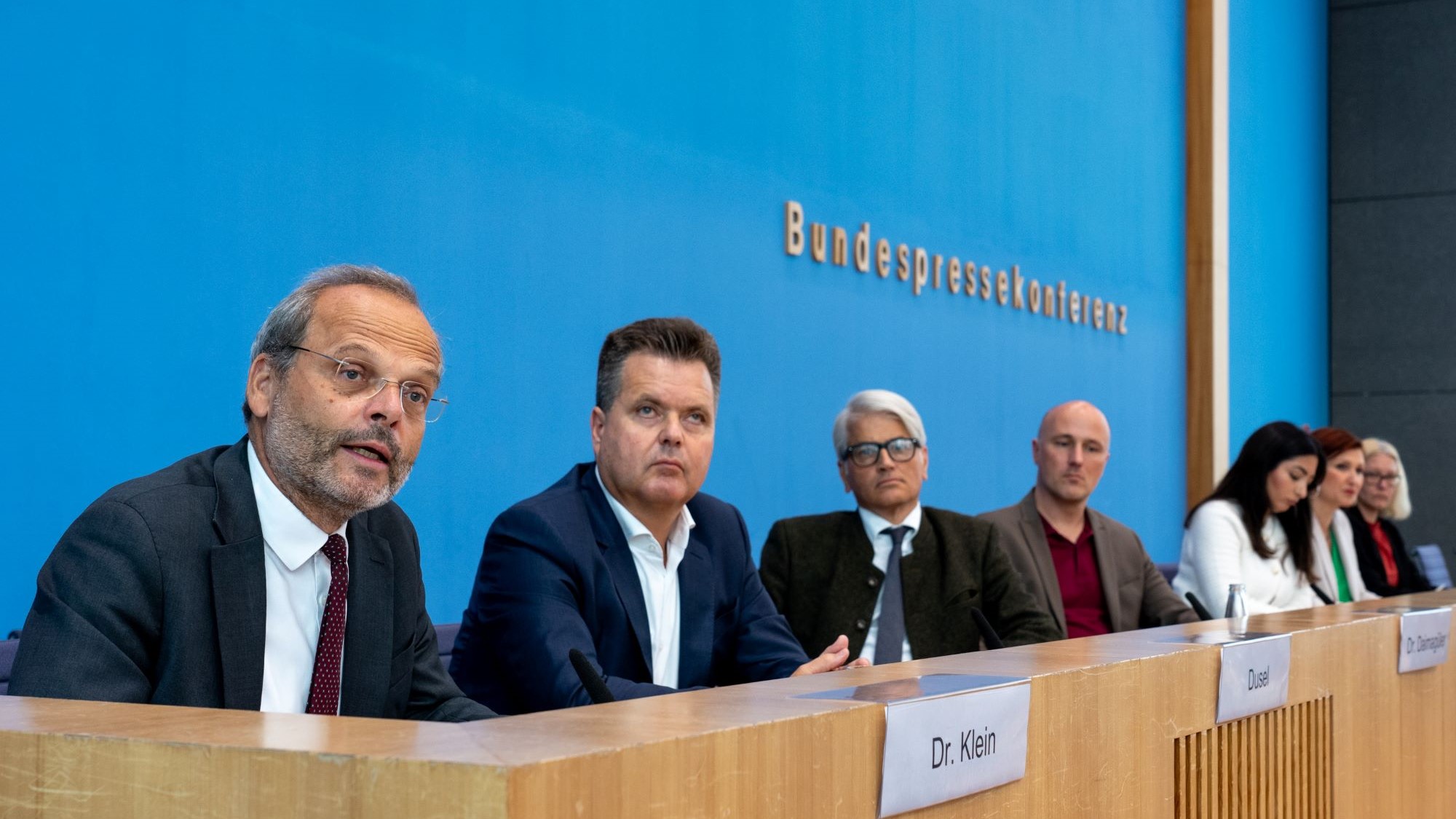A nation gripped by moral panic

Since the Hamas attacks on 7 October 2023, Germany has been making headlines internationally for its repression of progressive artists and intellectuals who are critical of Israel. Many of those targeted by these aggressive political and media campaigns hail from the Global South, alongside numerous critical Jewish voices.
On 7 November 2024, German lawmakers passed a controversial new resolution to combat antisemitism, titled "Never Again is Now: Protecting, Preserving and Strengthening Jewish Life in Germany." Backed by a broad cross-party alliance, including the far-right AfD, the resolution framed Germany's Arab population as the primary source of antisemitism, denounced perfectly legal forms of protest and expression, and conflated antisemitism with criticism of Israel.
Among its fiercest critics were Jewish intellectuals, who issued an open letter arguing that the resolution would "endanger", rather than "protect", Germany's Jewish population by "associating all Jews with the actions of the Israeli government, a notorious antisemitic trope." Another resolution, targeting antisemitism in schools and universities, will be debated in parliament in December.
This article will trace the social, bureaucratic and legal processes that led to this point. The struggle over the definition of antisemitism and a specific codification of the collective memory of the Nazi past represent the central foundations on which these processes were set in motion. In 2023, Masha Gessen examined this dynamic in a New Yorker article about the German culture of remembrance: "At some point, the efforts began to seem static and closed off, as if it were not only about commemorating history, but also about ensuring that only this specific history is remembered—and only in this way."
Is Germany experiencing a moral panic?
The sociological concept of a moral panic is useful to single out the mechanisms through which a specific conception of antisemitism is implemented in Germany, and how it leads to the suppression and criminalisation of dissenting views. A moral panic refers to the widespread and sometimes exaggerated fear that some evil force is attacking the culture or well-being of a society. The sociologist and criminologist Stanley Cohen popularised the term in his 1973 book "Folk Devils and Moral Panics", in which he analysed British youth subculture.
According to Cohen, "societies appear to be subject, every now and then, to periods of moral panic. A condition, episode, person or group of persons emerges to become defined as a threat to societal values and interests; its nature is presented in a stylised and stereotypical fashion by the mass media; the moral barricades are manned by editors, bishops, politicians and other right-thinking people; socially accredited experts pronounce their diagnoses and solutions; ways of coping are evolved or (more often) resorted to."
As part of this process, "folk devils" are stigmatised as deviant, and considered to be outsiders in relation to mainstream societal values. They are portrayed as posing a threat to these values, and seen as responsible for what comes to be defined as a social problem. Moral entrepreneurs—from journalists to politicians—trigger and steer the panic, with the potential consequence of creating new laws that ultimately increase their control over society.
In Germany, this moral panic dynamic can be singled out in several recent cases in which accusations of antisemitism were used to attack intellectuals. Examples include:
- the resignation of Peter Schäfer from his position as Director of the Jewish Museum Berlin in June 2019;
- the retracted invitation of Cameroonian political theorist Achille Mbembe to the Ruhr-Triennale in March 2020;
- the resignation of artist Ranjit Hoskote from the selection committee of the documenta 16 art festival in November 2023;
- the postponement of the Hannah Arendt Prize award ceremony for the journalist Masha Gessen in December 2023;
- the dismissal of anthropologist Ghassan Hage from his position at the Max Planck Institute in Halle in February 2024;
- the backlash against filmmaker Basel Adra and journalist Yuval Abraham following their speeches at the award ceremony of the Berlinale Film Festival in February 2024;
- the dismissal of philosopher Nancy Fraser from the Albertus Magnus Professorship in April 2024;
- the rescindment of the Schelling Architecture Foundation’s theory prize for British artist James Bridle, citing the German parliament's new antisemitism resolution, in November 2024.
The main steps I single out in this process of institutionalising a moral panic in Germany are: the adoption of the highly contested IHRA definition of antisemitism; the creation of a bureaucratic body devoted to the fight against antisemitism as separate from the fight against racism and discrimination in general; and the definition of the non-violent boycott of Israel by the Boycott, Disinvestment and Sanctions (BDS) movement as antisemitic.

These developments have resulted in the establishment of a new administrative apparatus and power structure that has turned the fight against antisemitism into an instrument of racialisation and repression.
Redefining antisemitism
A main pillar in the German approach to the fight against antisemitism is the adoption of the definition of antisemitism proposed in 2016 by the International Holocaust Remembrance Alliance (IHRA). Breaking with the main scholarly and legal definition that defined antisemitism in relation only to the Jewish people, the definition introduced specific references to Israel. "Manifestations [of antisemitism] might include the targeting of the state of Israel, conceived as a Jewish collectivity," according to the IHRA definition. "However, criticism of Israel similar to that levelled against any other country cannot be regarded as antisemitic."
This core definition was accompanied by examples of antisemitism, including "denying the Jewish people their right to self-determination, e.g., by claiming that the existence of a State of Israel is a racist endeavour"; "drawing comparisons of contemporary Israeli policy to that of the Nazis"; or "holding Jews collectively responsible for actions of the state of Israel."
The IHRA definition has been highly contested in its form and content. The general definition has been criticised as imprecise and selective. The examples lack clarity on the conditions under which criticism of Israel is antisemitic and when not. A related development has been an overall tendency to consider not just holocaust denial as antisemitic, but also any invocation of holocaust-related concepts when discussing Israeli policies. This includes references to ghettos, apartheid, or genocide.

Jew, Israeli, Zionist
The political scientist David Ranan doubts that anti-Semitism is more pervasive among Muslims than non-Muslims. Currently, however, this thesis is being perverted and used to serve questionable political ends. By Sonja Zekri
The definition adopted in Germany includes the IHRA provision that antisemitism can also be directed against the state of Israel. However, the limiting second clause—concerning comparisons with criticism of other countries—is missing, which is crucial for understanding the current stance of German institutions. The definition, modified in its meaning, was established in schools, legal training and police training. In November 2019, shortly after the attack on a synagogue in Halle, the German Rectors' Conference made the IHRA definition a guideline at German universities.
In 2020, a group of 220 scholars of antisemitism and the Holocaust developed a counter-proposal to the IHRA definition. In this Jerusalem Declaration, antisemitism is defined as "discrimination, prejudice, hostility or violence against Jews as Jews (or Jewish institutions as Jewish)" which distinguishes antisemitism from criticism of Israel: "Because the IHRA definition is unclear on important points and allows for different interpretations, it has created confusion and sparked controversy, which has weakened the fight against antisemitism." Despite the involvement of academics from many prestigious institutions, the Jerusalem definition has never been seriously considered at an institutional level in Germany.
Commissioners for the fight against antisemitism
Another aspect of this process in Germany is the investment of public resources into the creation of a bureaucracy devoted to the fight against antisemitism, in a way that has detached it from the fight against racism and discrimination in general.
In 2018, a government resolution called for the appointment of an antisemitism commissioner, as well as a legal strengthening of the state's powers to expel foreigners based on accusations of antisemitism. The Bundestag then decided to establish the office of the Federal Government Commissioner for Jewish Life and the Fight against Antisemitism, which is part of the Federal Ministry of the Interior. The role has since been held by Felix Klein.
The Federal Ministry of the Interior published the following description of the new commissioner's task: "to coordinate the relevant measures taken by all the federal ministries. He will also serve as contact person for Jewish groups and organizations, and as a liaison for federal, state and civil society measures to combat antisemitism. The Commissioner will also coordinate a standing joint federal and state commission made up of representatives of the responsible bodies and will provide public information as well as civic and cultural education to increase public awareness of current and past forms of antisemitism."

The establishment of this new role was part of the construction of what Masha Gessen calls "a vast bureaucracy that includes commissioners at the state and local level, some of whom work out of prosecutors’ offices or police precincts… They have no single job description or legal framework for their work, but much of it appears to consist of publicly shaming those they see as antisemitic, often for 'de-singularizing the Holocaust' or for criticizing Israel. Hardly any of these commissioners are Jewish. Indeed, the proportion of Jews among their targets is certainly higher."
The vagueness of the commissioners' exact roles, the unclear criteria for selection, and the tendency to expand their range of autonomous action have produced a multitude of semi-legal regulations. For example, since 7 October German officials, including Klein as well as the Interior Minister Nancy Faeser, have repeatedly claimed that the slogan “from the river to the sea, Palestine will be free” is antisemitic because it denies Israel's right to exist. While the police have systematically persecuted activists who use the slogan, considering it as indicative of support for terrorism, courts have been indecisive, issuing sentences in some cases and judging its use as protected under freedom of expression in others.
The influence of these commissioners, who generally have little actual knowledge of Judaism, has increased the influence of pro-Israel groups in Germany. As Susan Neiman, the Jewish director of the Einstein Center in Potsdam, notes: "none of the commissioners was raised as a Jew, though one converted soon after his appointment; most have little understanding of Jewish complexity or tradition… To compensate for their unfamiliarity, the commissioners rely on two sources for information about Jews, Israelis, and Palestinians: the Israeli embassy, and the Central Council for Jews in Germany, one of the more right-leaning Jewish organisations in the world."
The (semi-)criminalisation of BDS
Many victims of repression have been targeted after signing petitions or otherwise engaging with initiatives linked to the non-violent BDS movement. In May 2019, a joint motion was passed in parliament recommending that state funding be withheld from events and institutions connected to BDS. The movement's "patterns of argumentation and methods" were declared antisemitic.
The motion, supported by the CDU/CSU, SPD, and FDP parties as well as large sections of Alliance 90/The Greens, argued that the call to boycott "leads to the branding of Israeli citizens of the Jewish faith as a whole", and was therefore "unacceptable and must be strongly condemned." The press release reported that "the Bundestag thus resolutely opposes any form of antisemitism as soon as it emerges and condemns the BDS campaign and the call for a boycott. Furthermore, no organisations that question Israel's right to exist should receive financial support. Projects that call for a boycott or support the BDS movement should not receive financial support."
As it was not legally binding, the declaration that BDS is antisemitic did not go through constitutional court. While administrative courts have in some cases endorsed complaints against the withdrawal of public resources for events involving BDS supporters, the resolution has been used to delegitimise and discipline many individuals and groups, including some of the many Jews who are part of the BDS network. The resolution has also resulted in the penalisation of individuals and groups that are part of other broader networks to which BDS also belongs. In the 2023 Verfassungsschutzbericht (Constitutional Protection Report) the BDS movement was listed as extremist, a move that means that BDS could now be under surveillance by the German intelligence service.

A brazen act of state repression
German lawmakers are considering a new draft resolution that claims to combat antisemitism in educational institutions. Instead, it presents a one-dimensional view of Jewish life and erases crucial space for debate on Israeli politics and Germany's role in Gaza.
As with the BDS declaration, the Nationale Strategie gegen Antisemitismus und fuer Juedisches Leben (NASAS), approved by the German Government in 2022, established that "antisemitism must be condemned even if it is expressed in acts that are not punishable as criminal." Without further specification, the document confirmed that "financial support for organisations that question Israel's right to exist is prohibited, as is the funding of projects that call for a boycott of Israel or actively support the BDS movement."
The NASAS document cites the concept of wehrhafte Demokratie, a democracy that is able to defend itself. It declares that "all forms of antisemitic discrimination and the spread of hatred towards Jews must be dealt with consistently. A defensive democracy must not provide any means or spaces for this."
Moral panic as an instrument of repression
The implementation of the IHRA definition, the appointment of the antisemitism commissioner, and the criminalisation of BDS are all part of a broader trend toward juridification—the expansion of legal regulations into more areas of life. As the fight against antisemitism becomes detached from the fight against discrimination and racism, the measures associated with it are often legally uncertain. In fact, the entire process outlined in this article has taken place on a semi-legal basis. As many of the measures are not enshrined in law, no judgements can be made on their constitutionality. This weakens the ability of those affected to appeal.
The entrepreneurs of moral panic in Germany today operate in an institutional context that they themselves have helped to construct. The institutionalisation and bureaucratisation of the fight against antisemitism is now led by a specific branch of the administration which is equipped with material resources and an unclear scope of action, and which promotes the expansion of its own power.
The moral panic in Germany has paved the way for administrative practices that have led not only to the criminalisation of Palestinian symbols, demands for freedom and even expressions of solidarity with civilian victims in Gaza, but also to the withdrawal of funding for associations and individuals defined—without a court ruling—as BDS-affiliated or, even more vaguely, as Israel-haters.
Freedom of speech, opinion and assembly in Germany is thus subject to a labelling process in which perfectly legal behaviours are stigmatised based on the arbitrary attribution to them, by moral entrepreneurs, of antisemitic motives. This leads to a "clash of civilisations" rhetoric and turns the moral panic into a mechanism of oppression. Perspectives that are pro-Palestinian or critical of Israel are stigmatised and silenced.
© Qantara.de
